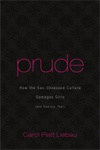 I almost gave up reading Prude. I have read other books like this and have found they follow a fairly consistent pattern. The first few chapters are always the hardest to get through. Where my interest in this kind of book is in its cultural commentary and analysis, the initial chapters seem always to be filled with examples of sexual transgression. I suppose this is necessary to build the author’s case that “our sex-obsessed cultural damages girls (and America too).” And so the first half of the book tells story after story and provides example after example of the moral decline of America. The author moves through web sites, magazines, television shows, popular music and fashion, showing how in each of these areas, girls are receiving damaging messages about their bodies and about sexuality. Television shows model sexual perversion as freedom and popular music objectifies both sex and sexuality. Web sites provide lurid details of base sexuality and consider it normal while the latest fashions seek to bare bodies for all to see. We know all of this, though there is still room to be shocked and disgusted. This continues for nearly 150 pages and by the end of the seventh chapter I had just about had enough. I put the book down.
I almost gave up reading Prude. I have read other books like this and have found they follow a fairly consistent pattern. The first few chapters are always the hardest to get through. Where my interest in this kind of book is in its cultural commentary and analysis, the initial chapters seem always to be filled with examples of sexual transgression. I suppose this is necessary to build the author’s case that “our sex-obsessed cultural damages girls (and America too).” And so the first half of the book tells story after story and provides example after example of the moral decline of America. The author moves through web sites, magazines, television shows, popular music and fashion, showing how in each of these areas, girls are receiving damaging messages about their bodies and about sexuality. Television shows model sexual perversion as freedom and popular music objectifies both sex and sexuality. Web sites provide lurid details of base sexuality and consider it normal while the latest fashions seek to bare bodies for all to see. We know all of this, though there is still room to be shocked and disgusted. This continues for nearly 150 pages and by the end of the seventh chapter I had just about had enough. I put the book down.
But I picked it up again after seeing advertising for this book in Christian magazines and publications. It seems clear that, though this book is not published by a Christian imprint or by a Christian author (as far as I know), it is being marketed to Christians. And for that reason I thought I would read the second part and seek to understand how the author, Carol Liebau, analyzes all of these forces—what they mean and how they are affecting American girls.
Liebau does this over about 100 pages. In chapter 8 she discusses “Paying the Piper: The Toll on Young Girls and the Cost to America.” Strangely, for a book being marketed to Christians, though she covers the physical toll, the economic toll and the emotional toll, she neglects the spiritual. While certainly the factors she outlines in this book may have serious consequences to girls emotions and bodies and to the nation’s economy, they also impact a person’s ability to know and to honor God and the way a person understands God. This is a serious consequence of our culture’s perverse view of sexuality but one that is, unfortunately, neglected in this book.
In subsequent chapters she proposes a new sexual feminism that will once again celebrate sexual restraint rather than promiscuity, suggesting that this will allow women to reclaim their true power—“the power to hold men to standards of behavior that honor the differences between the sexes, even as it recognizes their intrinsic equality.” She writes of the rise of moral relativism and the dire consequences of that major transformation and then of examples of hope—organizations that have arisen to challenge the status quo. And finally, she seeks to reclaim the concept and the word “Prude” so it is no longer a mark of shame, but of pride.
In a sense the book’s power is not in the analysis but in the descriptions; not in the latter half of the book, but in the first half. Reading the awful details of moral decline is not easy, but it does allow us to get a glimpse into the unique challenges girls face today. Gone are the days when fathers would protect their daughters and when mothers would seek to ensure their daughters were chaste. Gone are the days when sexual restraint was a virtue. Instead, girls, often from their earliest days, are sexualized—taught that they are little more than the sum of their [private] parts. This hypersexualization harms girls and, as the author shows, harms nations. I would argue, though, that the harm to America goes far beyond economics and outbreaks of new and ugly sexually transmitted diseases. The harm goes as deep as the soul, scarring girls who will soon be women, searing consciences and keeping women (and men!) from understanding the true power and beauty of sexuality.
If we wish to get sexuality right and if we wish to temper the decline of sexual morals, we’ll need more than prudes. We’ll need men who act like real men, protecting women rather than taking advantage of them; we’ll need fathers who love their daughters enough to protect them; we’ll need mothers who are deeply involved in their daughter’s lives; but mostly we’ll need to return to the Source, to the One who created sex, who gave it to us as a gift, and who desires that we use it for His glory.
Notable Quotes
“Sometimes it seems that sexiness has become the most important measuring stick for determining what is worthy of public interest; being ‘sexy,’ as most celebrities would attest, has become the ultimate accolade.”
“Ironically, many of the [dating] customs that today are dismissed as limiting were actually empowering, because they offered young women a way to resist unwelcome sexual activity without themselves being labeled as cruel, frigid, or uninviting.”
“Every time looser standards for dress or behavior become socially sanctioned, it becomes more difficult to retrench—and twice as difficult to resist the next step toward the vulgar or extreme on the cultural continuum.”










